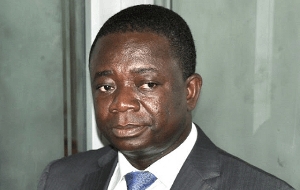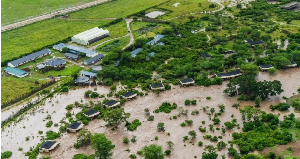Diasporia News of Friday, 17 April 2009
Source: GNA
Report: Ghanaian emigrants found in 33 countries
Dodowa (GAR), April 17, GNA - Ghanaian emigrants can be found in 33 countries across the world, according to a report on findings released in Accra on Friday.
After Africa, the most important regions of destination for Ghanaian emigrants are Europe comprising (14.3 per cent) and North America (10.2 per cent). Ghanaian emigrant population ranged from 1.5-3 million between 2003 and 2006.
Professor Peter Quartey, Consultant, International Organization for Migration (IOM), who presented the findings at the opening of a two-day National Migration Workshop organized by IOM, said more than 50 per cent
of Ghanaian health professionals trained in the country also lived and worked abroad.
The workshop formed part of a two-year European Commission, Swiss and Belgian-funded project for 10 countries, including Ghana, Congo, Cote d'Ivoire, Mali, Mauritania, Niger and Cameroon on migration in West and Central Africa which sought to develop national profiles for strategic policy development in their respective countries. Professor Quartey said the findings also indicated that there had been acceleration of skilled migration from Ghana to developed countries adding, "Ghana has an emigration rate of 42.5 per cent which is one of the highest in West Africa".
He said the project would therefore enhance governmental capacities to effectively manage migration and also help respective governments to collect and analyze policy-relevant data through their participation in strategic planning.
In Ghana, the project would fill the data gap and strengthen its ability to evaluate and improve migration policies for development. Professor Quartey added that, data analysis showed lack of accurate information on the number of Ghanaians living outside the country saying the data base of the Ghana Immigration Service did not fully capture unauthorized entries.
Dr Kwasi Apea-Kubi, Deputy Minister of the Interior, said the project would complement the efforts of the National Migration Bureau in its coordination at the various sectors affected by migration. He said the National Migration Policy would bring about a migration management programme for the people and government of Ghana.
"We will want to see migration as brain-gain and not as brain-drain. We will also want to encourage circular migration for development and stem the tide of irregular migration." He said there was an initiative of ECOWAS Commission to fund Migration Projects in the sub-region.
Mr. Davide Terzi, Chief of Missions, IOM, said the collaboration had helped Ghana to define its own objectives and priorities in migration management, adding, "Government ownership is a priority in activities we implement in member states."
Mr. Frank Laczko, who gave an overview called on countries to have exclusive policy on migration.
He said though it was becoming a global issue, a policy framework would help in putting up the needed infrastructure to accommodate it.










